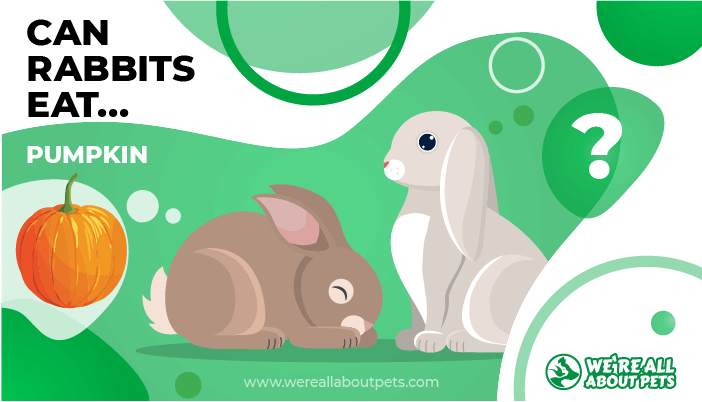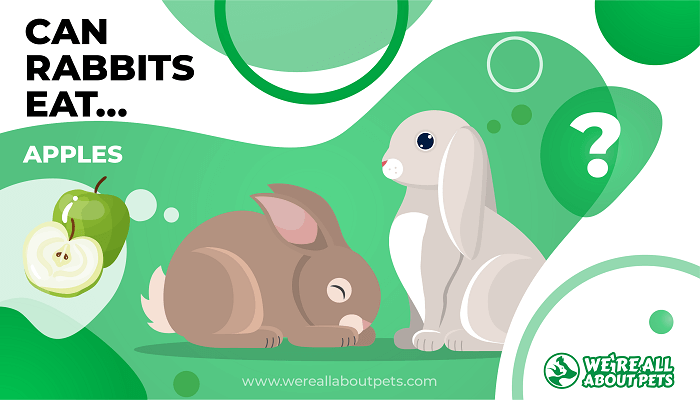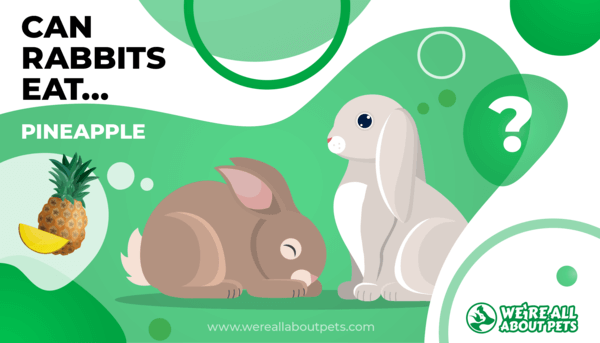Can Rabbits Eat Cucumber?
This page contains affiliate links. We may earn money or products from the companies mentioned in this post through our independently chosen links, which earn us a commission. Learn More
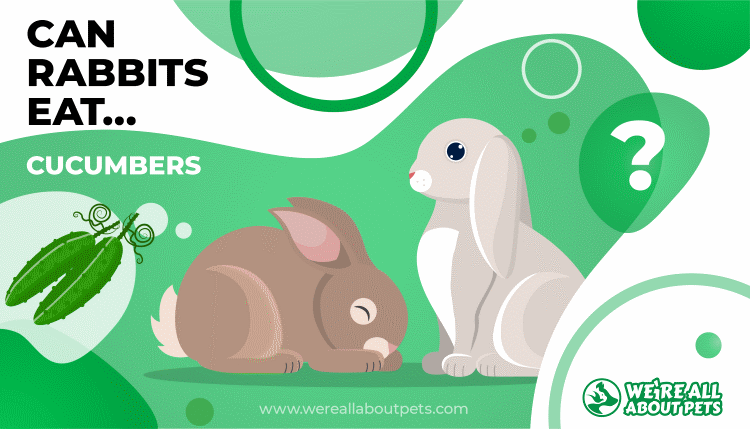
Love adding cucumbers to your salad or munching on them whenever you’re in the mood for a low-calorie snack?
We do! And as it turns out, so do many rabbits.
Before you give your bunny an entire cucumber though, there are definitely some things you should know about feeding cucumber to rabbits.
For example, how much is too much? How often can a rabbit have cucumber, anyway?
The answers to these questions – and others – might surprise you!
Cucumber Nutrition Stats
Cucumbers offer a satisfying crunch and a light, pleasant flavor – all in a low-calorie package!
An entire cup of cucumber slices (that’s way more than what you’ll be giving your bunny, by the way) contains:
- 15 calories
- 8 g carbohydrates
- .6 g fiber
- .6 g protein
- .2 g fat
Cucumber Nutritional Facts

Even though they’re very high in water and low in calories, cucumber provides some important nutrients. True – you’d have to eat a ton of it to make a real dent in your diet, but you get some antioxidants and minerals when you nibble on those refreshing slices.
Eat a cup of cucumber and you’ll get:
- 17 mcg vitamin K
- 3 mg vitamin C
- .1 mg vitamin B6
- 6 mg magnesium
- 13 mg potassium
It’s worth noting that these values are for cucumber with skin. If you remove the skin from the cucumber, you won’t get nearly as many nutrients.
Can Rabbits Have Cucumber?
Yes! Rabbits can have cucumber as a healthy treat. Since it’s so high in water though, it shouldn’t be a major part of your rabbit’s diet. Instead, it should be something you provide every once in a while.
Before you chop up that cucumber, there are a couple of other essentials to keep in mind about cucumber for rabbits.
Is Cucumber Good For Rabbits?
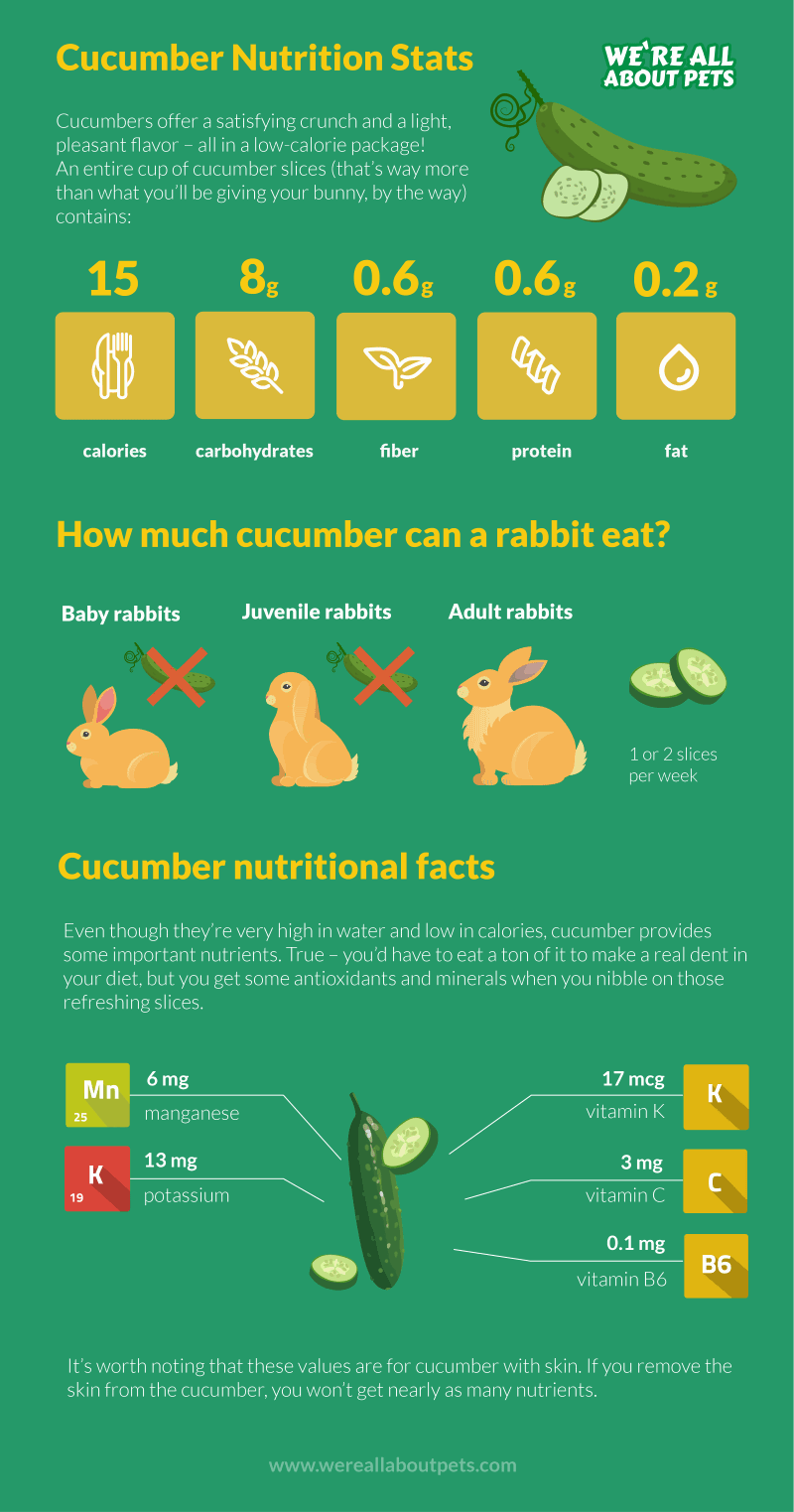
While it’s a wonderful, hydrating snack for you, cucumber is OK for rabbits. Yes, just OK. The reason for this is that it’s high in water (confusing, perhaps, but we’ll dig a little deeper into this in a second) and relatively low in essential nutrients.
So, your adorable bunny rabbit needs to drink lots of fresh water. You’re probably wondering why they shouldn’t have too many watery snacks.
The main reason is that too many watery snacks can fill your rabbit up and prevent them from eating enough hay, which in turn can cause a dangerous case of diarrhea.
Some rabbits get gas from cucumber and that is potentially dangerous and almost certainly uncomfortable. Don’t worry, though: If your rabbit like cucumber, it’s OK to feed them small amounts.
How Much Cucumber Can A Rabbit Eat?
Great question! Here’s how much cucumber to feed your rabbit:
| Age | Amount |
| Baby rabbits | None |
| Juvenile rabbits | None |
| Adult rabbits | 1 or 2 slices per week |
Wait, what? You read correctly. You want to take a very careful approach when feeding cucumber to your rabbit. Since a rabbit’s digestive system is so sensitive – and as cucumber can sometimes cause tummy troubles – you should only offer a small amount.
When giving cucumber to a rabbit for the first time, start with about ¼ of a slice, perhaps ¼ inch thick – about the same size as a very small bite of cucumber for a person.
See if your rabbit even likes cucumber as some will turn their noses up at it or give it a taste and be uninterested. If your test is a fail and your rabbit nopes out of the cucumber, don’t worry: There are lots of other healthy treats for rabbits!
If your bunny likes the cucumber (plenty of rabbits really do enjoy it!) then watch for signs of digestive problems over the next several hours.
Watch out for signs that your rabbit has gas, i.e. lying still, curling up, or pressing their tummy on the floor, or even rumbling sounds coming from their abdomen.
Watch for diarrhea, too – if your rabbit has runny stools instead of producing the usual round, firm pellets, it’s a sign that they aren’t tolerating that cucumber well and it’s time to choose a different treat.
If there are no problems, go ahead and increase your bunny’s cucumber treat to ½ slice next time and repeat the process of watching for problems.
Gradually increase to whole slices or keep your rabbit’s cucumber intake at ½ slice a few times per week. It’s best to choose moderation and provide a variety of different treats!
Watch your bunny for signs of digestive problems during the next few hours. Check for diarrhea and look for other signs of tummy trouble, too: If your rabbit is lying still for a long time with only small shifts in position, it’s possible that your rabbit has trapped gas.
Can My Rabbit Eat Cucumber Leaves?
Cucumber leaves can be a very tasty treat for rabbits so long as you offer leaves without too many prickly spines. Some rabbits really like cucumber leaves while others turn up their noses.
Offer a few at a time, just once or twice per week. Make sure that the leaves haven’t been treated with pesticides or herbicides, and be sure to wash them well just as you do with other fruits and vegetables for yourself and your furry friend.
How Often Can A Rabbit Eat Cucumber?
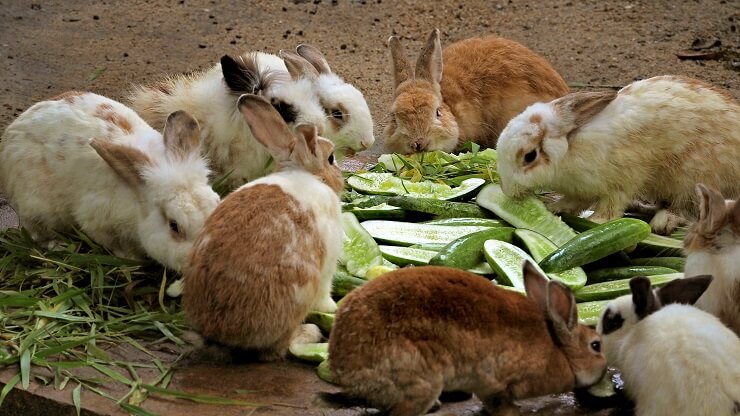
It’s up to you to decide how often to treat your bunny to cucumber slices but in all, remember not to exceed that two slice per week limit.
If you add these veggies to your own salad every day and you prep your bunny’s salad at the same time, feel free to offer about ¼ slice.
You can give a rabbit cucumber every day this way. If you want to offer larger amounts less often, go ahead and do it that way! Remember that it’s best to provide a wide range of natural, healthy snacks. This approach promotes balance, plus it keeps your bunny’s life interesting.
The Correct Diet is Important
When wild rabbits eat cucumbers, it happens by accident – and the truth is that they’re far more likely to nibble on cucumber leaves than they are to go for those big, green cukes!
So, what should a rabbit really be eating every day? In general, try to offer:
- As much fresh hay as your rabbit can eat – it should always be available.
- An endless supply of clean, fresh water – refill their water container at least once each day.
- Age-appropriate rabbit pellets (look at the label to see what a serving size is and use a cup to measure out the right amount).
- A green salad once per day or divided into two or more servings per day if you have the time: In all, offer about a cup of mixed leafy green vegetables per two pounds of body weight, along with some other veggies.
- Rabbit treats in moderation; in general, it’s ok to offer a teaspoon of rabbit-safe fruit per two pounds of body weight. If you purchase bunny treats, be sure to follow instructions about proper feeding. Even if your rabbit begs for more, you never want to overdo it!
- About a tablespoon of seeds such as pumpkin seeds or sunflower seeds. You can skip these if they’re already in your rabbit’s food, or if your rabbit dislikes them. Be sure to check which seeds are safe for rabbits!
What Are Other Healthy Alternatives To Cucumber In A Rabbit’s Diet?
There are tons of healthy vegetables for rabbits. As you’ll notice, most of of them are leafy greens including different types of lettuce.
Try offering your bunny a variety of the following treats:
- parsley
- basil
- swiss chard
- rainbow chard
- beet tops
- cilantro
- radish tops
- carrot tops
- radish tops
- turnip greens
- spinach
- romaine lettuce
- buttercrunch lettuce
- butter lettuce
- bibb lettuce
- cabbage
- brussels sprouts
- arugula
- romaine lettuce
- broccoli
- dandelion greens
- escarole
- fennel
- bok choy
- yu choy
- endive
- kale
- beets
- carrots
- bell peppers (sweet varieties only)
It’s very important to rotate the types of treats and greens you offer your rabbit since a compound called oxalate can build up and cause kidney issues when the same exact greens are offered in high quantities every day.
Be sure not to overfeed root vegetables such as carrots and beets; look for how much to offer based on your rabbit’s weight and you’ll be well on your way to keeping your bunny healthier.
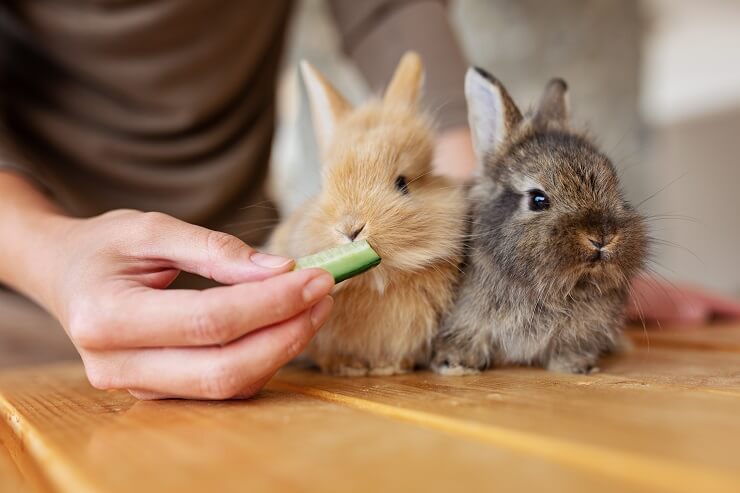
While giving your rabbit cucumber and other treats keeps their diet interesting and provides well-rounded nutrition, a little really does go a long way!
Frequently Asked Questions
Is cucumber safe for rabbits?
Yes, in small amounts. It’s generally safe to feed rabbits cucumber so long as you don’t give too much at once, or offer it with other treats that have high water content.
Can I give cucumber to a baby rabbit?
It’s so cute to think about a baby bunny eating cucumber! Unfortunately, baby rabbits have extra-sensitive digestive systems. Since too many treats can cause illness and even lead to death, keep your baby rabbit on a strict diet of hay and age-appropriate rabbit food until at least 6 months of age. You can also offer very tiny amounts of romaine lettuce and other leafy greens – but be sure to watch very carefully for signs of gas and diarrhea. If your baby rabbit is sick, take them to the vet immediately.
Can cucumber make my rabbit sick?
Yes, too much cucumber can make a rabbit sick. Most rabbits like cucumber and can eat small amounts, but we are serious when we tell you that it’s really important not to give your rabbit a lot of cucumber all at once. If you notice that your rabbit is uncomfortable because of trapped gas or if they have diarrhea, call your vet for advice.






